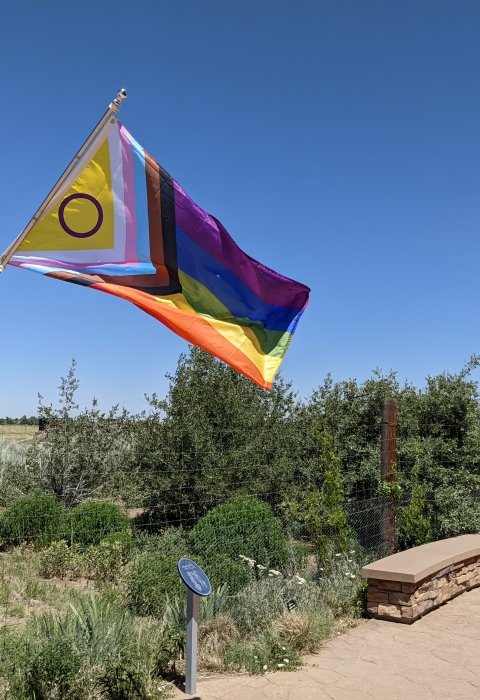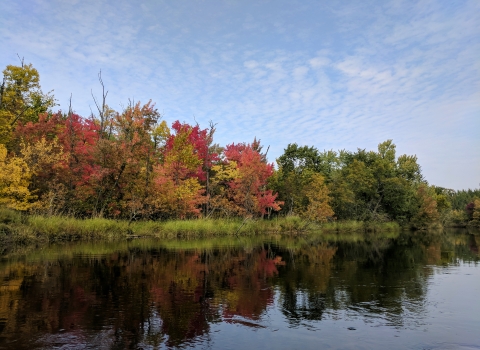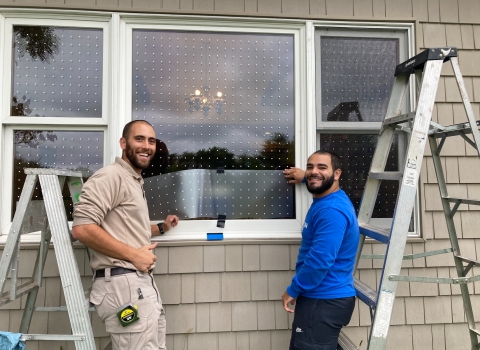“Because we will only change our future when we recognize what needs to be changed and when we say the words out loud.” – Secretary of the Interior Deb Haaland
The Service’s strategy to advance diversity, equity, inclusion, and accessibility rests on the belief that when employees can flourish as their authentic selves without barriers to acceptance and success, they will achieve our conservation mission with excellence and innovation. Grassroots employee groups are drivers of inclusion and positive change in the Service.
Employee resource groups (ERGs) provide welcoming and influential communities, and over the last two years several have been established in the Service for LGBTQ+; Black, Indigenous, and People of Color; and employees with disabilities, as well as allies. Numerous other groups within the Department of the Interior and broader federal community provide supportive forums for Asian Americans, Native Hawaiians, and Pacific Islanders; military veterans; and other communities of employees. Additionally, communities of practice among employees with shared interests and experiences are transforming the culture of the Service.
We hear below from the leaders of some ERGs and communities of practice within the Service about the important roles these groups serve for both employees and fish and wildlife conservation.
FWS Pride ERG
Since its inception two years ago, the FWS Pride ERG has grown to nearly 300 members working to foster and cultivate a safe, welcoming, open, and inclusive environment for not just LGBTQ+ employees but also visitors to public lands we manage, volunteers, interns, contractors, retirees, partners, and allies.
“The FWS Pride ERG has worked hard to collaborate within the agency to address discriminatory and non-inclusive policies, but our biggest feat is existing as a safe place for LGBTQIA+ co-workers. We represent a banner that community members and allies can stand behind to defend themselves and others against poor treatment based on gender or sexual orientation. We strive to bring down barriers for not only our employees but also our contractors, volunteers, retirees, and visitors. We know that by thoughtfully including people of all genders and orientations, we can more fully engage employees and the American people we serve.”
Black, Indigenous, and People of Color (BIPOC) ERG
This emerging ERG promotes solidarity and support among BIPOC employees and allies to remove barriers to success, harness strengths, and create positive and lasting change to advance justice, diversity, equity, inclusion, and accessibility.
“BIPOC communities have been historically excluded from conservation, and the echoes of this history still reverberate today. Conservation does not exist within a vacuum; it is not immune to the racism, discrimination, and violence that BIPOC communities face every day. The deaths of George Floyd, Breonna Taylor, and countless others necessitated the need for a place not only where BIPOC employees can process the range of emotions brought forth by these events but where we can bring our whole selves to the workplace. FWS BIPOC ERG’s vision is for everyone to have a seat at the table, tackling today’s conservation challenges and rectifying past injustices.”
Federal Asian Pacific American Council
FAPAC’s Department of the Interior chapter furthers the interests of Asian Americans, Native Hawaiians, and Pacific Islanders (AANHPI) and fosters professional development and networking among its members within the federal network.
“From a small, passionate team, we have grown as a vibrant chapter to engage members of the AANHPI community and allies across the DOI, supporting and amplifying each other as we build awareness and community both nationally and locally. We lift up emerging leaders and share and celebrate our stories. We create a safe space to share our fears, pains, joys, and triumphs. We bring awareness to the rise in hate, violence, and discrimination toward the AANHPI community, acknowledging these issues are not new, supporting a renewed commitment to advocate for ourselves and others.”
People with Disabilities ERG
As the Service’s newest official employee resource group, the FWS People with Disabilities ERG will be a powerful voice for employees who identify as having seen or unseen disabilities and their allies.
“Answers to conservation’s biggest issues must come from everyone. Sustainable solutions that work globally for all types of people need to be gathered from all types of people. ERGs act to give a voice and community to all employees and to uplift marginalized groups. Our group gives community strength to the ideas and innovations furthering conservation action from employees with disabilities.”
Institutional Change Community of Practice
The ICCoP formed from the passion and desire of Urban Wildlife Conservation Program practitioners to create lasting change in the Service. Its goals are adopting a community-focused approach to conservation, and increasing justice, equity, diversity, and inclusion in conservation. Since its launch in June 2020, the community has grown from 30 members connected by the Urban Program to over 170 members from across programs, regions, and jobs, The community attributes this growth to the relevance of the ICCoP goals to everything the Service does to meet its mission.
“Community members come together to share experiences, build knowledge, collaborate, and problem solve. Members have chartered a Service Mentoring Advisory Workgroup, developed a widely shared Inclusive Language Guide, catalyzed efforts to improve the use of special hiring authorities, and have help the Service make progress toward its justice, equity, diversity, inclusion, and accessibility goals.”
Women Working in Wildlife
This group actively empowers and inspires women in the Service, providing a venue to share and learn from all genders, helping women aspire to and succeed in leadership positions, and welcoming all women into the conservation field.
“Women Working in Wildlife was established in 2018 with the goal of inspiring and empowering women in the Service. The team accomplishes this through creating and maintaining a network that advocates for women by highlighting achievements, promoting development, and providing support. Prior to, and then through the pandemic, we have facilitated a series of workshops, panel discussions, and events for all employees that focus on emotional, mental, and physical wellness and lifting each other up. In the same way biodiversity supports resilience in an ecosystem, the WWW believes that by championing women we can promote a more diverse, inclusive, and resilient Service that better reflects the public we serve.”
_________
These employee groups are a sample of the dozens focused on improving inclusion and creating welcoming workplaces in the Service and throughout the federal community. Participation is open to all employees, and feedback has shown that their availability has been crucial to employees' acceptance, well-being, and even retention on the workforce. These employee-driven efforts are essential to the Service’s strategy to advance diversity, equity, inclusion, and accessibility (DEIA) and with secretarial and White House orders to embed DEIA principles and actions into everything the Interior Department and its bureaus do to fulfill our mission.



